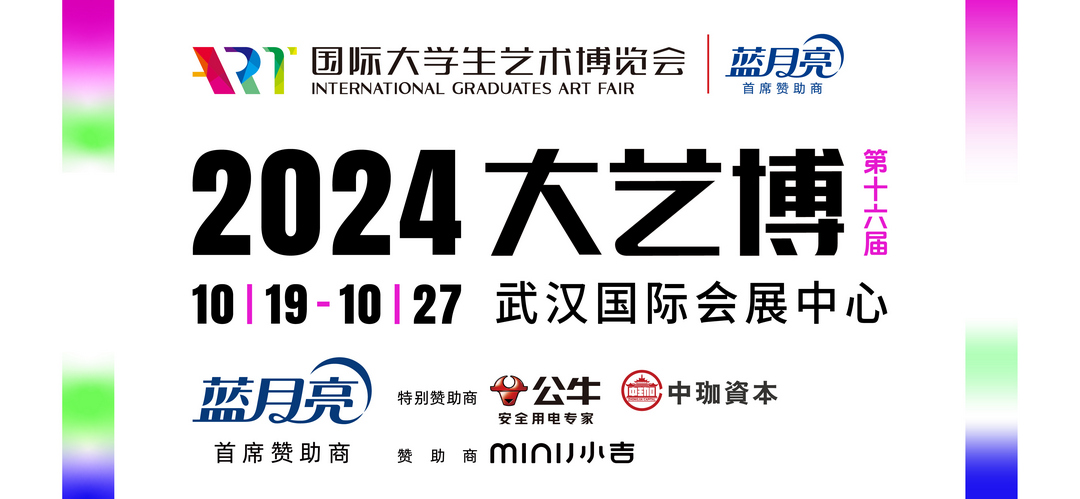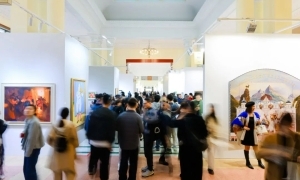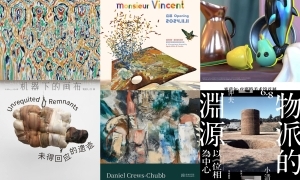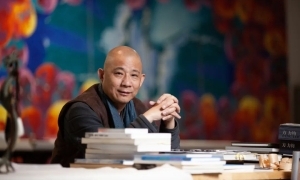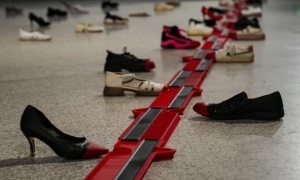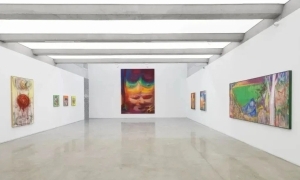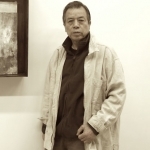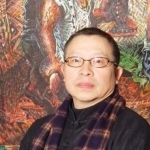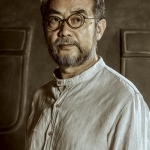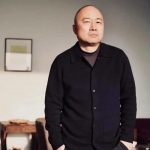罗杰
记者:我们知道您是90年代毕业于四川美术学院的,为什么直到2006年才开始绘画的创作和展览活动,能和我们谈下之前都在做什么吗?
罗杰(以下简称罗):很长一段时间里,艺术对于我来说只是一种梦想.但那个时候最主要的还不是艺术,而是怎样找一个工作,和那个时代的绝大部分中国人一样, 养活自己才是最主要的,画画没啥出路,但那作为一种可能的生活方式还是留在了我意识里.以前在干其他工作的同时老在想画画;也一直想回到这条路上来.
我干的工作很繁杂,画过动画背景,也画过建筑效果图,干过广告,装饰设计,园林设计,规划设计,房产策划……乱糟糟的。
记者:这些经历对您现在的创作有影响吗?
罗杰:当然有影响啦,职业对人的塑造作用是巨大的,无论从观念还是行为……
记者:2006年至今您的创作都是以《囚》命名,为什么一直执著于此没有换其他主题?
罗杰:也许这是我的原点吧,每个人的感受方式不一样,做艺术的方式和出发点也就不一样,艺术是情感的载体,像我这样孤僻内敛的人,从本质上说,对宏大叙事和晦涩的逻辑思辨不是很感兴趣,(令人不安的是,很多观众看我的画面时老往宏大叙事和后现代的价值冲突上解读),我注重内心真实,内心感受是艺术表达最丰富的源泉。我不擅长交际,与人相处也常常感到紧张,其实像我这样的人在这个社会属于沉默的大多数,有类似的敏感而纤细的神经,承受力不强,我就是这样,外面很平常的事物出现在我的感知中要么被放大,要么被扭曲变形,我就经常因一点小事辗转难眠,如果我一个人呆在画室里,肯定像一个安静的孩子,但与人交往,却常常认真地干些得罪他人或冒天下之大不韪的傻事而浑然不觉。恰如其分地处理生活中的事情在我这里总是那么困难,这种性格特点让我头疼不已。有一句套话:性格即命运,我深以为然.这也许和我这个家族的基因有关,我父亲就是一个这样的人,郁郁寡欢,刻板木纳。单位开会就因一点小事顶撞领导,让人难堪。因此他就把自己关在由孤僻和倔强编织的习惯之网中,就像给自己套上了一幅看不见的枷锁。很长一段时间,我会觉得那个逝去的老人套着那副枷锁的意象很悲凉,但现在我却不那么认为了,因为从某种角度上来说,枷锁具有双重含意---禁锢自己,同时也禁锢这个世界。对他来说,也许应该是保护自己,被禁锢的是这个世界吧。
很早之前,我就觉得自己也套着一幅和父亲身上一样的枷锁,我能感受到它的存在。它每天都禁锢住我,我不可能无视它的存在。如果是其他人,也许会选择逃避,选择反叛或选择沉默,但作为视觉艺术家,我找了一种方式把它视觉化了。这就是你所看到的以《囚》为名的作品。同时作为一个普通人,我看到自己关在屋子里画出来的那些东西,就像自己身上脱下来的皮。
之所以一直做,没换主题,那是因为我对这种令人难以释怀的家族记忆着迷;我想自己对此着迷本身就具有一种文化态度,同时也觉得致力于一种与之对应的视觉形式的探索不是件很容易的事,还需要一段时间才能把它在艺术上一步步推向极致。
绳的意向 20×30cm Acrylic on paper 1995
记者:在2005年的创作中,里面的对象还不是纯粹的人物,大部分只是扭结在一起的绳子本身,那么后来您创作的用绳子编结出来的人是现在创作思路的一种完善吗?
罗杰:你真是一个细心的人啊。
是的,在05年前,我的创作是没有现在这种面貌的,而是纠缠在一起的乱麻,人的形象算不上是完善,而是一条河流的两条分支,而我更在乎05年以前的状态,那种状态更纯粹。
记者:艺术家可选择的绘画对象很多,特定的绘画元素会成为艺术家特定的代表符号,您的特殊就在于“绳子”,为什么选它,有什么特殊情结吗?
罗杰:我不知道从什么时候开始,我对纠缠不清,盘根错节的编制意象着迷,但就我现存的“拿得出手的”和现在的风格有渊源的作品是1995年的那张纸本小画。也是用细密的线条把画面缠满,我想这种习惯和自己的早年生活有关吧,比如童年常常看妈妈养蚕,蚕吐丝是一个意向;另外我父亲对编织渔网那种病态的痴迷和依赖。
记者:用无数绳索编织成人的躯体,他有灵魂吗,怎样突出“囚和自由”的关系?
画面上的东西是没有灵魂的,那只是画布和颜料,贡布里希曾说过,没有艺术,只有艺术家。你在古往今来的伟大和不伟大的画面上所看到的图像都说不上有灵魂,那只是艺术家逝去的情感记忆;是他们的排泄物。但后来的人可以通过这些东西窥见艺术家的灵魂。作为一个性格上有点问题的人,我看到自己关在屋子里画出来的那些东西,就像自己身上脱下来的一层皮。是一种艺术的解脱方式。
记者:数不清的绳索缠绕一团,您是想解开还是继续纠结下去?
罗杰:我都说不清自己是想解开还是想纠结下去。或者二者皆有?
记者:您后期的作品中似乎都带有叙事性,充斥着暴力色彩,绳索人互相之间进行着争执、殴打、厮杀,弄得伤痕累累,奔放的情绪像洪水一发不可收拾,这样强烈的感情来源于哪?
罗杰:其实这些东西很大程度上是偶尔所得,不是刻意为之,来源于哪里我都不知道,但和那些强烈的情绪相比我更在乎作画时平静安详的过程。我很享受它,它是一种很大的反差。我觉得这个更有意思。
记者:作品中带有自残性质的创作过程,包括对生活和周围世界的一种反抗和呐喊,刻画诸多缠绕的绳索需要巨大时间和精力的付出甚至于说透支,更让我们感受到您内心的一种深刻的痛苦体验。
罗杰:刚才我不是提到这一点吗?我画这些东西一点都不痛苦,也许人们看到那么繁杂拥挤的画面,会认为这家伙有自虐倾向,但在我这里算不上自残。而且很享受,一个人呆在自己的空间里安静地画画。也许别人看到我的画面传达的是另一种强大的视觉张力。那种力量是由一双普通的手,一颗作画时淡然的心,在平静安详的时间流逝中一笔一笔地完成的。相反,在不画画而陷于人与事的纷扰时,我反而会感到痛苦万分。
记者:07年开始还穿插了人与人之间调侃的场景,人物的媚笑加上墨镜、吊带、内衣等更增加了人物的时尚造型,情绪上也有了变化,是要与时俱进?
罗杰:不是吧,只是朝另一个方向做一些尝试。浅尝即止。
记者:您不厌其烦的编制绳索人,会一直继续下去吗,有没有考虑换其他的艺术语言?
罗杰:其实我早就在探索其他视觉形式了。毕竟试验性是当代艺术的基本品格,我不可能在一种语言上老这样折腾下去。过一段时间你就会明白的。
记者:一直以来您在画面色彩处理上基本是无彩色为主,因为这样压抑的色彩构成方式足以表现您强烈的感受?
罗杰:我喜欢黑白灰的感觉。由这些色调所构成的画面,最接近我的内心感受。也更纯粹。
记者:诸多眼花缭乱的线组成不同的角色,您在创作时需要极大的耐性和缜密的思维,有没有被诸多绳索扰乱过,那么怎样处理?
罗杰:没有被扰乱过。挺好的。
记者:有趣的是08年开始绳索人为什么长头发了,画面上产生两种质感的强烈对比。
罗杰:那是最近的事情,是有些变化,在画面构成上更丰富了。
记者:最近会有什么新的活动吗?
罗杰:4月24号有一个个人展览在美国中部圣路易斯安那,LOCOCO画廊。现在正在办签证。
2009.3.20.
Interview with Luo Jie
1. (LOFT ART): We know that you graduated from Sichuan Fine Arts Institute, but why did you start to be engaged in creation and exhibition from as late as 2006? Could you share with us what you did before that?
Luo: For a long period of time, art was just a dream for me. But at that time, what was most important was not art but how to find a job. Like most of the Chinese people at that time, the most important thing was to feed myself, and there was hardly any hope for me to make it as a painter. But it still remained in my consciousness as a possible way of life. I used to be obsessed by the thought of painting and have been looking forward to returning to this track.
Luo: I did all sorts of work—animation background, architectural renderings, advertising, decoration designing, landscape designing, planning & designing, and real estate promotion scheming …such a medley!
2. (LOFT ART):Has such experience had an influence on your creative work?
Luo: Of course it has. Occupations have a great shaping effect on people, no matter in mentality or in behavior.
3.(LOFT ART):All your creative work since 2006 has been named Imprisonment. Why are you so persistent in this regard and why haven’t you had a change in theme?
Luo: Perhaps this is my starting point. Different people have different perceptions, and they have different approaches and starting points towards art. Art is a carrier of feelings. As an unsociable and introverted person, essentially speaking, I am not interested in indulging myself in telling big stories and expressing obscure logical ideas. (What makes me feel uneasy is that a lot of audience tends to construe my paintings with big stories and post-modernistic conflicts in values.) On the contrary, I attach importance to inner reality, and inner feelings are the most abundant source for artistic expression. Clumsy at socializing and often nervous with people, I actually belong to the silent majority of the society, with similarly sensitive and delicate nerves and unable to bear too much. I am such a person. Externally ordinary matters can be either magnified or distorted in my perception. I often become sleepless because of trivial matters. Staying in the gallery by myself, I would be like a quiet child, while socializing with people, I would earnestly do some silly things which either offend other people or defy world opinion, which I am totally unaware of. It is always so difficult for me to deal with matters in everyday life appropriately. Such a characteristic in personality has been a headache for me. To use a stereotyped expression: Personality determines destiny. I am deeply convinced of that. This may have something to do with my familial genes. My father is just such a person—depressed and joyless, inflexible and simple. He would contradict his superiors at meetings just because of trifles, making them embarrassed. Therefore, he confined himself within the net woven out of his habitual eccentricity and stubbornness, just like a set of invisible shackles on himself. For a long time, I would feel that the image of the deceased old man with that set of shackles was so sad, but now I no longer think like that, for shackles have double meanings from certain perspective—shackles for himself, and shackles for this world as well. For him, maybe they served as protection, and what was shackled was this world.
A long time ago, I started to feel that there were a similar set of shackles on myself like those on my father, and I could felt their existence. It shackled me every day so that it was impossible for me to ignore their existence. If I had been someone else, I would have chosen to escape, to rebel or to keep silent, while as a visual artist, I found a way to visualize them, which is what you see the works named Imprisonment. Meanwhile, as an ordinary person, when I see the stuff I painted during my confinement in the house, it is like skin cast off from my body.
The reason why I have been persistent in doing this and haven’t changed the theme is that I am fascinated with this family memory that I can hardly dismiss from my mind. I believe that there is a cultural attitude in my fascination with it itself, at the same time I don’t think it is an easy job to devote oneself to the exploration of a visual form corresponding to it. It still needs some time to push it to its ultimate state in art.
4. (LOFT ART): I your creative works in 2005, the objects within them were still not pure figures but just ropes intertwining together. Then are the figures you wove out of ropes later on an improvement in your creative thinking at that time?
Luo: You are such a careful person!
Yes, before 2005, my creative works didn’t take this form but were in a tangle, and the images of figures are not an improvement actually but two tributaries of one river. I care more about the state before 2005, which was purer.
5. (LOFT ART): Artists have a wide range of choices when referring to objects for painting, and certain elements in painting can become certain symbols for artists. You are special in ropes. Why have you chosen them? Is there any special complex behind it?
I can’t recall clearly when I began to be fascinated with tangled images such as twisted roots and gnarled branches, but among my current collection of presentable art pieces, a little drawing on paper I created in 1995 has some relationship with my current style. It is also filled with intertwining fine close lines, and I suppose that this habit is related to my early life. For instance, in my childhood, I often watched my mother raising silkworms, and silkworms’ silk-spinning is an image; besides, I was also morbidly fascinated with and dependent upon my father’s fishnet weaving.
6. (LOFT ART): Do the human bodies woven out of numerous ropes have souls? How is the relationship between “imprisonment and freedom”highlighted?
Luo: The things on the surface of drawings do not have souls. They are just canvas and pigments. Just as Ernst Gombrich once put it, “There really is no such thing as Art. There are only artists.” For all of the images you’ve seen on the paintings throughout the ages, great or not, you can’t say they have a soul---they are just the emotional memory of artists; they are the excretion of them. But people from later generations can get a glimpse of the souls of artists from these things. As a person with problems in personality, when I see the stuff I painted within the confinement of the house, it seems that it is a layer of skin I have shed from my own body. It is an artistic way of freeing oneself.
7. (LOFT ART):Countless ropes intertwine together. Do you want to untie them or leave them as they are?
Luo: I am not sure whether I want to untie them or leave them as they are. Maybe I want both?
8. (LOFT ART):Your later works seem to be tinted with narrative characteristics, full of violence, and the ropes and humans are wrangling, beating and fighting with each other, leaving scars all over. The wild emotions run out of control like floods. Where do these strong feelings come from?
To a large extent, these things are actually accidental rather than intentional. Even I myself don’t know where they come from. But compared with the strong emotions I care more about the quiet and serene process of painting itself. I enjoy it so much, and it is a great contrast. I consider it (the process) as more meaningful.
9. (LOFT ART):The creative process of works with self-inflicted injuries involves an opposition to and an outcry against life and the outside world. It takes considerable time and energy, even to the extent of over exhaustion, to depict so many tangling ropes, which all the more makes us feel a kind of profound painful experience deep in your heart.
Luo: Didn’t I mention this point just now? I felt no pain while drawing these things. Perhaps people would believe that this guy have a masochistic tendency when they see scenes so miscellaneous and crowded. But here I am not inflicting injuries on myself; instead, I am enjoying it so much—staying in my own space and painting quietly. Perhaps other people may found another kind of strong visual tension conveyed by my paintings. That kind of power comes from an ordinary pair of hands and a detached heart in painting. The paintings have been finished stroke by stroke amid the quiet and serene passage of time. On the other hand, when I am not painting but involved in turmoil with people or matters, I will be feeling great agony.
10. (LOFT ART): Since 2007, scenes of gags among people started to be introduced, and bewitching smiles of the figures plus sunglasses, backless blouses and underclothes further add to the fashionable styles of the figures; besides, there are also changes in emotions. Are you proceeding with the times?
Luo: I am afraid not. They are just some tentative techniques towards another direction. I will stop trying that after gaining some experience.
11. (LOFT ART):Since 2008, the figures began to have definite bright eyes, and the images began to be relaxed. Is there a change in your attitude?
Luo: My attitude has been like this and there has been no change in it. Instead, your question makes me think that you have some preconceived attitude in it, that is, my early attitude is different from my current one.
You can only say that the images are different. So are the visual perceptions they convey to people. My attitude towards painting has been consistent.
12. (LOFT ART):You take great pains to weave ropes. Will you go on doing that? Have you considered other artistic languages?
Luo: As a matter of fact, I have been exploring other forms of visual representation for a long time. After all, experimentality is a basic characteristic of modern arts, and I can’t possibly devote myself to a single artistic language. You will understand what I mean in some time.
13. (LOFT ART):Your chromatic treatment of the images has largely been colorless. Is it because only such a depressing chromatic composition can express your strong feelings?
I like the feeling with black, white and grey. The images composed by such colors are closest to my inner feelings and they are also the purest.
14. (LOFT ART):During the process of your creation of figures, it takes great patience and meticulous thinking to create different roles with so many dazzling lines. Have you ever been disturbed by so many ropes? If so, how would you deal with that?
Luo: Never have I been disturbed by them. Everything has been OK.
15. (LOFT ART):It’s interesting that since 2008, the rope figures began to have hair and there is a sharp contrast between two feels on the images.
That’s something recently. There are some changes. As a result, the images have been enriched in composition.
16.. (LOFT ART):Will there be some new activities in the near future?
Luo: On April 24, I will hold a personal exhibition of works at Lococo’s Gallery in Louisiana, a central state in the Unites States. Now I am going through the procedures for a visa.
20.3.2009.
【编辑:小红】



